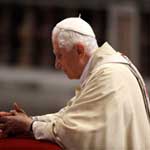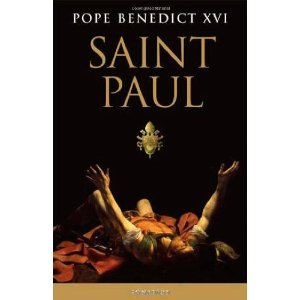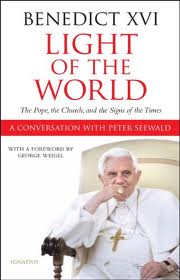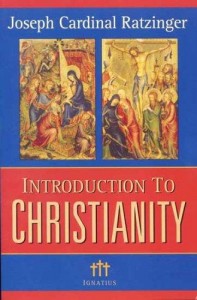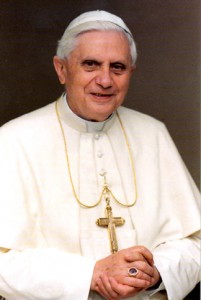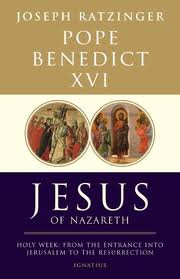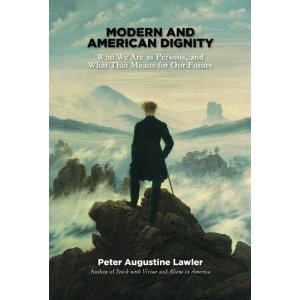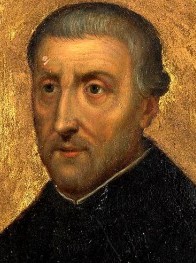For Complete Updated Text in English click here
VATICAN CITY, 25 MAY 2011 (VIS) – Continuing with his catecheses on prayer, Benedict XVI spoke in today’s general audience about the Patriarch Jacob and his fight with the unknown man at the ford of the Jabbok. The audience was held in St. Peter’s Square with 15,000 people in attendance.
The Bible, explained the Pope, describes Jacob as an astute man who obtains things through deception. At a certain point, he sets out to return to his homeland and face his brother, whose firstborn birthrights he had taken. Jacob waits overnight in order to cross the ford safely but something unforeseen occurs: he is suddenly attacked by an unknown man with whom he struggles the entire night. The story details their struggle, which has no clear winner, leaving the rival a mystery. “Only at the end, when the struggle is finished and that ‘someone’ has disappeared, only then will Jacob name him and be able to say that he had struggled with God”.
Once the fight is over Jacob says to his opponent that he will only let him go if he blesses him. Jacob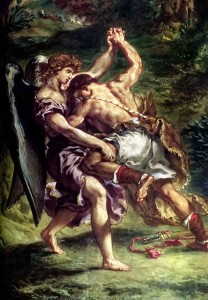 “who had defrauded his brother out of the first-born’s blessing through deceit, now demands [a blessing] from the unknown man, in whom he perhaps begins to see divine traits, but still without being able to truly recognize him. His rival, who seems restrained and therefore defeated by Jacob, instead of bowing to the Patriarch’s request, asks his name. … In the Biblical mentality, knowing someone’s name entails a type of power because it contains the person’s deepest reality, revealing their secret and their destiny. … This is why, when Jacob reveals his name, he is putting himself in his opponent’s hands. It is a form of surrender, a complete giving over of himself to the other”.
“who had defrauded his brother out of the first-born’s blessing through deceit, now demands [a blessing] from the unknown man, in whom he perhaps begins to see divine traits, but still without being able to truly recognize him. His rival, who seems restrained and therefore defeated by Jacob, instead of bowing to the Patriarch’s request, asks his name. … In the Biblical mentality, knowing someone’s name entails a type of power because it contains the person’s deepest reality, revealing their secret and their destiny. … This is why, when Jacob reveals his name, he is putting himself in his opponent’s hands. It is a form of surrender, a complete giving over of himself to the other”.
Paradoxically, however, “in this gesture of surrender, Jacob also becomes the victor because he receives a new name, together with the recognition of his victory on the part of his adversary”. The name “Jacob”, Benedict XVI continued, “recalls the verb ‘to deceive’ or ‘to supplant’. After the struggle, in a gesture of deliverance and surrender, the Patriarch reveals his reality as a deceiver, a usurper, to his opponent. The other, who is God, however, transforms this negative reality into a positive one. Jacob the deceiver becomes Israel. He is given a new name as a sign of his new identity … the mostly likely meaning of which is ‘God is strong, God wins’. When, in turn, Jacob asks his rival’s name, he refuses to say it but reveals himself in an unmistakable 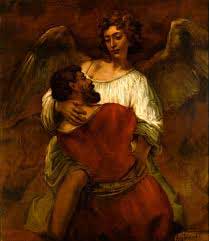 gesture, giving his blessing. … This is not a blessing obtained through deceit but one given freely by God, which Jacob can now receive because, without cunning or deception, he gives himself over unarmed, accepts surrender and admits the truth about himself”.
gesture, giving his blessing. … This is not a blessing obtained through deceit but one given freely by God, which Jacob can now receive because, without cunning or deception, he gives himself over unarmed, accepts surrender and admits the truth about himself”.
In the episode of the fight at the ford of Jabbok, the Pope observed, “the people of Israel speak of their origin and outline the features of a unique relationship between God and humanity. This is why, as also affirmed in the Catechism of the Catholic Church, ‘from this account, the spiritual tradition of the Church has retained the symbol of prayer as a battle of faith and as the triumph of perseverance'”.
“Our entire lives”, concluded the Holy Father, “are like this long night of struggle and prayer, passed in the desire of and request for God’s blessing, which cannot be ripped away or won over through our strength, but must be received with humility from Him as a gratuitous gift that allows us, finally, to recognize the face of the Lord. And when this happens, our entire reality changes: we receive a new name and God’s blessing”.
AG/Â Â Â Â Â Â Â Â Â Â Â Â Â Â Â Â Â Â Â Â Â Â Â Â Â Â Â VIS 20110525 (620)
updated…the complete text in English from Vatican.va:
top
BENEDICT XVI
GENERAL AUDIENCE
St. Peter’s Square
Wednesday, 25 May 2011
[Video]
Dear Brothers and Sisters,
Today I would like to reflect with you on a text from the Book of Genesis which recounts a rather curious incident in the narrative of the Patriarch Jacob. It is a passage that is not easy to interpret, but it is important for our life of faith and prayer; we are talking about the story of his struggle with God at the ford of the Jabbok, a portion of which we just heard.
As you will recall, Jacob had deprived his twin brother Esau of his birthright in exchange for a dish of lentils and then, by trickery, managed to receive the blessing from his father Isaac, now very elderly, taking advantage of the latter’s blindness. Having fled from Esau’s wrath, he took refuge with one of his relatives, Laban; he married, acquired some wealth, and was returning to his homeland, ready to face his brother having first put into place some prudent provisions. However, when everything was ready for this meeting, after having had those who were with him cross the ford of the stream that marked the boundary of Esau’s territory, Jacob, who had remained behind alone, was suddenly set upon by an unknown man with whom he wrestled the whole night. This hand-to-hand combat, which we find described in chapter 32 of the Book of Genesis, became for him a singular experience of God.
Night is the favourable time for acting secretly, the best time, therefore, for Jacob to enter his brother’s territory unseen, perhaps thinking to take Esau by surprise. It is he, however, who is surprised by an unforeseen attack, one for which he was unprepared. Having used his cleverness to try to escape a dangerous situation, he thought he had managed to have everything under control; instead he now finds himself forced to enter a mysterious struggle that catches him alone and gives him no opportunity to organize a proper defence. Unarmed, in the night, the Patriarch Jacob wrestles with someone. The text does not specify the identity of the aggressor; it uses a Hebrew word that indicates “a man†in a generic sense, “one, someoneâ€; it is, therefore, a vague, indeterminate definition that purposely keeps the assailant shrouded in mystery. It is dark, Jacob does not manage to see his opponent clearly, and even for the reader, for us, he remains anonymous; someone is opposing the Patriarch, and this is the only certain data supplied by the narrator. Only at the end, when the wrestling is over and that “someone†will have disappeared, only then will Jacob name him and be able to say that he had wrestled with God.
The episode, therefore, takes place in darkness and it is difficult to ascertain not only the identity of Jacob’s assailant, but also how the struggle is going. On reading the passage, it is rather difficult to determine which of the two contenders is gaining the upper hand; the verbs used often lack a specific subject, and the actions take place almost in a contradictory manner, so that when it looks as though one of the two is winning, the next action immediately denies that and shows the other to be the victor. At the beginning, in fact, Jacob seems to be the stronger and of his opponent, the text says, “he did not prevail over him†(v. 25); yet he strikes Jacob’s hip at its socket, dislocating it. Thus one thinks that Jacob would have to give in, but instead it is his opponent who asks him to release him; and the Patriarch refuses, setting one condition: “I will not let you go, unless you bless me†(v. 27). The one who tricked his brother and robbed him of the blessing of the firstborn now claims it from the stranger, thus perhaps beginning to perceive some kind of divine meaning, but without yet being able to recognize it for certain.
His rival, who seems to be held back and therefore defeated by Jacob, rather than giving in to the Patriarch’s request, asks him his name: “What is your name?â€. And the Patriarch replies: “Jacob†(v. 28). Here the struggle takes an important turn. In fact, knowing someone’s name implies a kind of power over that person because in the biblical mentality the name contains the most profound reality of the individual, it reveals the person’s secret and destiny. Knowing one’s name therefore means knowing the truth about the other person and this allows one to dominate him. When, therefore, in answer to the unknown person’s request Jacob discloses his own name, he is placing himself in the hands of his opponent; it is a form of surrender, a total handing over of self to the other.
However, in this act of surrender paradoxically Jacob too emerges victorious because he receives a new name with the recognition of his victory by his adversary, who says to him: “You shall no longer be spoken of as Jacob, but as Israel, because you have contended with divine and human beings and have prevailed†(v. 29). “Jacob†was a name that recalled the Patriarch’s problematic beginnings; in Hebrew, in fact, it recalls the term “heel†and takes the reader back to the time of Jacob’s birth when, as he left his mother’s womb, he held onto the heel of his twin brother (cf. Gen 25:26), almost prefiguring the unfair advantage he would take over his brother in adulthood; however the name Jacob also recalls the verb “to deceive, to supplantâ€. Well, now, in the struggle in this act of surrender and submission, the Patriarch reveals his true identity as a deceiver, the one who supplants; however the other, who is God, transforms this negative reality into something positive: Jacob the deceiver becomes Israel, he is given a new name as a sign of a new identity. Here, too, the account maintains its deliberate duplicity because the more probable meaning of the name Israel is “God is strong, God is victoriousâ€.
Therefore Jacob has prevailed, he won — his adversary himself says so — but his new identity, which he has received from the adversary himself, affirms and bears witness to God’s victory. And when Jacob in turn asks his opponent his name, the latter refuses to say it, but reveals himself in an unequivocal gesture, giving him the blessing. The blessing that the Patriarch had requested at the beginning of the struggle is now granted him. However, it is not a blessing obtained through deceit, but one given freely by God, which Jacob can receive because he is now alone, without protection, without cunning or tricks; he gives himself over unarmed, agrees to surrender and confesses the truth about himself. Therefore, at the end of the struggle, having received the blessing, the Patriarch can finally recognize the other, the God of blessings: Truly, he says, “I have seen God face to face, and yet my life is preserved†(v. 30), and now he can cross the ford, the bearer of a new name but “conquered†by God and marked forever, limping because of the injury he received (v. 31).
Biblical exegetes give many interpretations to this passage; the scholars in particular recognize in it literary connotations and components of various genres, as well as references to some popular accounts. But when these elements are taken up by the authors of the Sacred texts and incorporated into the biblical narrative, they change their meaning and the text opens up to broader dimensions. For the believer the episode of the struggle at the Jabbok thus becomes a paradigm in which the people of Israel speak of their own origins and outline the features of a particular relationship between God and humanity. Therefore, as is also affirmed in the Catechism of the Catholic Church, “from this account, the spiritual tradition of the Church has retained the symbol of prayer as a battle of faith and as the triumph of perseverance†(n. 2573). The Bible text speaks to us about a long night of seeking God, of the struggle to learn his name and see his face; it is the night of prayer that, with tenacity and perseverance, asks God for a blessing and a new name, a new reality that is the fruit of conversion and forgiveness.
For the believer Jacob’s night at the ford of the Jabbok thus becomes a reference point for understanding the relationship with God that finds in prayer its greatest expression. Prayer requires trust, nearness, almost a hand-to-hand contact that is symbolic not of a God who is an enemy, an adversary, but a Lord of blessing who always remains mysterious, who seems beyond reach. Therefore the author of the Sacred text uses the symbol of the struggle, which implies a strength of spirit, perseverance, tenacity in obtaining what is desired. And if the object of one’s desire is a relationship with God, his blessing and love, then the struggle cannot fail but ends in that self-giving to God, in recognition of one’s own weakness, which is overcome only by giving oneself over into God’s merciful hands.
Dear brothers and sisters, our entire lives are like this long night of struggle and prayer, spent in desiring and asking for God’s blessing, which cannot be grabbed or won through our own strength but must be received with humility from him as a gratuitous gift that ultimately allows us to recognize the Lord’s face. And when this happens, our entire reality changes; we receive a new name and God’s blessing. And, what is more: Jacob, who receives a new name, and becomes Israel, also gives a new name to the place where he wrestled with God, where he prayed; he renames it Penuel, which means: “The Face of Godâ€. With this name he recognizes that this place is filled with the Lord’s presence, making that land sacred and thus leaving a memorial of that mysterious encounter with God. Whoever allows himself to be blessed by God, who abandons himself to God, who permits himself to be transformed by God, renders a blessing to the world. May the Lord help us to fight the good fight of the faith (cf. 1 Tim 6:12; 2 Tim 4:7) and to ask, in prayer, for his blessing, that he may renew us in the expectation of beholding his Face. Thank you.
top
Tags: catholic, catholic podcast, catholic prayer, cathollc spirituality, Patriarch Jacob, pope benedict xvi, the Patriarch
This entry was posted on Thursday, May 26th, 2011 at 8:22 am
You can follow any responses to this entry through the RSS 2.0 feed.
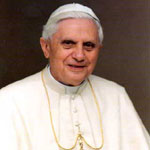 From Vatican.va (the extended version translated into English from the Italian)
From Vatican.va (the extended version translated into English from the Italian)
GENERAL AUDIENCE
(the fuller catechesis translated into English from the Italian text)
Dear brothers and sisters,
In the two previous catechesis we thought that prayer is a universal phenomenon, which – although in different forms – is present in the cultures of all time.
Today instead I would like to start out on a biblical path on this topic which will guide us to deepening the dialogue of the Covenant between God and man, which enlivened the history of salvation to its culmination, to the definitive Word that is Jesus Christ.
This path will lead us to reflect on certain important texts and paradigmatic figures of the Old and New Testaments. It will be Abraham the great Patriarch, the father of all believers (cf. Rom 4:11-12, 16-17), to offer us a first example of prayer in the episode of intercession for the cities of Sodom and Gomorrah.
And I would also like to ask you to benefit from the journey we shall be making in the forthcoming catecheses to become more familiar with the Bible, which I hope you have in your homes and, during the week, to pause to read it and to meditate upon it in prayer, in order to know the marvellous history of the relationship between God and man, between God who communicates with us and man who responds, who prays.
The first text on which we shall reflect is in chapter 18 of the Book of Genesis. It is recounted that the evil of the inhabitants of Sodom and Gomorrah had reached the height of depravity so as to require an intervention of God, an act of justice, that would prevent the evil from destroying those cities.
It is here that Abraham comes in, with his prayer of intercession. God decides to reveal to him what is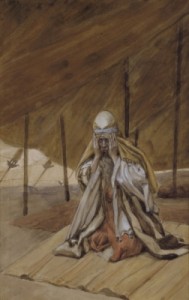 about to happen and acquaints him with the gravity of the evil and its terrible consequences, because Abraham is his chosen one, chosen to become a great people and to bring the divine blessing to the whole world. His is a mission of salvation which must counter the sin that has invaded human reality; the Lord wishes to bring humanity back to faith, obedience and justice through Abraham. And now this friend of God seeing the reality and neediness of the world, prays for those who are about to be punished and begs that they be saved.
about to happen and acquaints him with the gravity of the evil and its terrible consequences, because Abraham is his chosen one, chosen to become a great people and to bring the divine blessing to the whole world. His is a mission of salvation which must counter the sin that has invaded human reality; the Lord wishes to bring humanity back to faith, obedience and justice through Abraham. And now this friend of God seeing the reality and neediness of the world, prays for those who are about to be punished and begs that they be saved.
Abraham immediately postulates the problem in all its gravity and says to the Lord: “Will you indeed destroy the righteous with the wicked? Suppose there are fifty righteous within the city; will you then destroy the place and not spare it for the fifty righteous who are in it? Far be it from you to do such a thing, to slay the righteous with the wicked, so that the righteous fare as the wicked! Far be that from you! Shall not the Judge of all the earth do right?†(Gen 18: 23-25).
Speaking these words with great courage, Abraham confronts God with the need to avoid a perfunctory form of justice: if the city is guilty it is right to condemn its crime and to inflict punishment, but — the great Patriarch affirms — it would be unjust to punish all the inhabitants indiscriminately. If there are innocent people in the city, they must not be treated as the guilty. God, who is a just judge, cannot act in this way, Abraham says rightly to God.
However, if we read the text more attentively we realize that Abraham’s request is even more pressing and more profound because he does not stop at asking for salvation for the innocent. Abraham asks forgiveness for the whole city and does so by appealing to God’s justice; indeed, he says to the Lord: “Will you then destroy the place and not spare it for the fifty righteous who are in it?†(v. 24b).
In this way he brings a new idea of justice into play: not the one that is limited to punishing the guilty, as men do, but a different, divine justice that seeks goodness and creates it through forgiveness that transforms the sinner, converts and saves him. With his prayer, therefore, Abraham does not invoke a merely compensatory form of justice but rather an intervention of salvation which, taking into account the innocent, also frees the wicked from guilt by forgiving them.
Abraham’s thought, which seems almost paradoxical, could be summed up like this: obviously it is not possible to treat the innocent as guilty, this would be unjust; it would be necessary instead to treat the guilty as innocent, putting into practice a “superior†form of justice, offering them a possibility of salvation because, if evildoers accept God’s pardon and confess their sin, letting themselves be saved, they will no longer continue to do wicked deeds, they too will become righteous and will no longer deserve punishment.
It is this request for justice that Abraham expresses in his intercession, a request based on the certainty that the Lord is merciful. Abraham does not ask God for something contrary to his essence, he knocks at the door of God’s heart knowing what he truly desires.
Sodom, of course, is a large city, 50 upright people seem few, but are not the justice and forgiveness of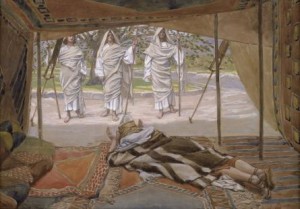 God perhaps proof of the power of goodness, even if it seems smaller and weaker than evil? The destruction of Sodom must halt the evil present in the city, but Abraham knows that God has other ways and means to stem the spread of evil. It is forgiveness that interrupts the spiral of sin and Abraham, in his dialogue with God, appeals for exactly this. And when the Lord agrees to forgive the city if 50 upright people may be found in it, his prayer of intercession begins to reach the abysses of divine mercy.
God perhaps proof of the power of goodness, even if it seems smaller and weaker than evil? The destruction of Sodom must halt the evil present in the city, but Abraham knows that God has other ways and means to stem the spread of evil. It is forgiveness that interrupts the spiral of sin and Abraham, in his dialogue with God, appeals for exactly this. And when the Lord agrees to forgive the city if 50 upright people may be found in it, his prayer of intercession begins to reach the abysses of divine mercy.
Abraham — as we remember — gradually decreases the number of innocent people necessary for salvation: if 50 would not be enough, 45 might suffice, and so on down to 10, continuing his entreaty, which became almost bold in its insistence: “suppose 40… 30… 20… are found there†(cf. vv. 29, 30, 31, 32). The smaller the number becomes, the greater God’s mercy is shown to be. He patiently listens to the prayer, he hears it and repeats at each supplication: “I will spare… I will not destroy… I will not do it†(cf. vv. 26,28, 29, 30, 31, 32).
Thus, through Abraham’s intercession, Sodom can be saved if there are even only 10 innocent people in it.
This is the power of prayer. For through intercession, the prayer to God for the salvation of others, the desire for salvation which God nourishes for sinful man is demonstrated and expressed. Evil, in fact, cannot be accepted, it must be identified and destroyed through punishment: The destruction of Sodom had exactly this function.
Yet the Lord does not want the wicked to die, but rather that they convert and live (cf. Ez 18:23; 33:11); his desire is always to forgive, to save, to give life, to transform evil into good. Well, it is this divine desire itself which becomes in prayer the desire of the human being and is expressed through the words of intercession.
With his entreaty, Abraham is lending his voice and also his heart, to the divine will. God’s desire is for mercy and love as well as his wish to save; and this desire of God found in Abraham and in his prayer the possibility of being revealed concretely in human history, in order to be present wherever there is a need for grace. By voicing this prayer, Abraham was giving a voice to what God wanted, which was not to destroy Sodom but to save it, to give life to the converted sinner.
This is what the Lord desires and his dialogue with Abraham is a prolonged and unequivocal demonstration of his merciful love. The need to find enough righteous people in the city decreases and in the end 10 were to be enough to save the entire population.
The reason why Abraham stops at 10 is not given in the text. Perhaps it is a figure that indicates a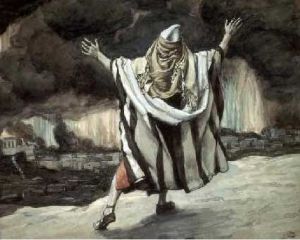 minimum community nucleus (still today, 10 people are the necessary quorum for public Jewish prayer). However, this is a small number, a tiny particle of goodness with which to start in order to save the rest from a great evil.
minimum community nucleus (still today, 10 people are the necessary quorum for public Jewish prayer). However, this is a small number, a tiny particle of goodness with which to start in order to save the rest from a great evil.
However, not even 10 just people were to be found in Sodom and Gomorrah so the cities were destroyed; a destruction paradoxically deemed necessary by the prayer of Abraham’s intercession itself. Because that very prayer revealed the saving will of God: the Lord was prepared to forgive, he wanted to forgive but the cities were locked into a totalizing and paralyzing evil, without even a few innocents from whom to start in order to turn evil into good.
This the very path to salvation that Abraham too was asking for: being saved does not mean merely escaping punishment but being delivered from the evil that dwells within us. It is not punishment that must be eliminated but sin, the rejection of God and of love which already bears the punishment in itself.
The Prophet Jeremiah was to say to the rebellious people: “Your wickedness will chasten you, and your apostasy will reprove you. Know and see that it is evil and bitter for you to forsake the Lord your God†(Jer 2:19).
It is from this sorrow and bitterness that the Lord wishes to save man, liberating him from sin. Therefore, however, a transformation from within is necessary, some foothold of of goodness, a beginning from which to start out in order to change evil into good, hatred into love, revenge into forgiveness.
For this reason there must be righteous people in the city and Abraham continuously repeats: “suppose there are…â€. “Thereâ€: it is within the sick reality that there must be that seed of goodness which can heal and restore life. It is a word that is also addressed to us: so that in our cities the seed of goodness may be found; that we may do our utmost to ensure that there are not only 10 upright people, to make our cities truly live and survive and to save ourselves from the inner bitterness which is the absence of God. And in the unhealthy situation of Sodom and Gomorrah that seed of goodness was not to be found.
Yet God’s mercy in the history of his people extends further. If in order to save Sodom 10 righteous people were necessary, the Prophet Jeremiah was to say, on behalf of the Almighty, that only one upright person was necessary to save Jerusalem: “Run to and fro through the streets of Jerusalem, look and take note! Search her squares to see if you can find a man, one who does justice and seeks truth; that I may pardon her†(5:1).
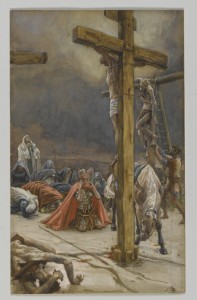 The number dwindled further, God’s goodness proved even greater. Nonetheless this did not yet suffice, the superabundant mercy of God did not find the response of goodness that he sought, and under the  siege of the enemy Jerusalem fell.
The number dwindled further, God’s goodness proved even greater. Nonetheless this did not yet suffice, the superabundant mercy of God did not find the response of goodness that he sought, and under the  siege of the enemy Jerusalem fell.
It was to be necessary for God himself to become that one righteous person. And this is the mystery of the Incarnation: to guarantee a just person he himself becomes man. There will always be one righteous person because it is he. However, God himself must become that just man. The infinite and surprising divine love was to be fully manifest when the Son of God was to become man, the definitive Righteous One, the perfect Innocent who would bring salvation to the whole world by dying on the Cross, forgiving and interceding for those who “know not what they do†(Lk 23:34). Therefore the prayer of each one will find its answer, therefore our every intercession will be fully heard.
Dear brothers and sisters, the prayer of intercession of Abraham, our father in the faith, teaches us to open our hearts ever wider to God’s superabundant mercy so that in daily prayer we may know how to desire the salvation of humanity and ask for it with perseverance and with trust in the Lord who is great in love. Many thanks.
Tags: Abraham, catholic, catholic podcast, catholic prayer, cathollc spirituality, pope benedict xvi, prayer
This entry was posted on Monday, May 23rd, 2011 at 5:37 pm
You can follow any responses to this entry through the RSS 2.0 feed.
Part 2…It just gets better when discussing our Holy Father’s teachings with Mark Brumley! It’s hard to find an equal to our Holy Father when you combine his gifts and talents as a theologian and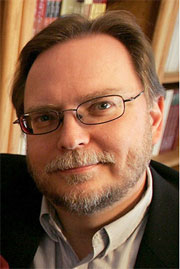 biblical scholar! As  a profound teacher and spiritual leader,  Pope Benedict XVI, through his Wednesday audience catechesis,  brings us the life and  legacy of St. Paul.  Mark Brumley joins us once again to discuss the richness of this work and offers us insights on this extraordinary saint.  Warning: Mark will inspire you to race out and pick up a copy (you’ll be so glad you did).
biblical scholar! As  a profound teacher and spiritual leader,  Pope Benedict XVI, through his Wednesday audience catechesis,  brings us the life and  legacy of St. Paul.  Mark Brumley joins us once again to discuss the richness of this work and offers us insights on this extraordinary saint.  Warning: Mark will inspire you to race out and pick up a copy (you’ll be so glad you did).
[powerpress]
Check out more on the book here
Tags: catholic, catholic podcast, catholic prayer, cathollc spirituality, mark brumley, pope benedict xvi
This entry was posted on Monday, May 9th, 2011 at 10:08 am
You can follow any responses to this entry through the RSS 2.0 feed.
Part 1…It’s hard to find an equal to our Holy Father when you combine his gifts and talents as a theologian and biblical scholar! As  a profound teacher and spiritual leader,  Pope Benedict XVI, through his Wednesday audience catechesis,  brings us the life and  legacy of St. Paul.  Mark Brumley joins us once again to discuss the richness of this work and offers us insights on this extraordinary saint.  Warning: Mark will inspire you to race out and pick up a copy (you’ll be so glad you did).
biblical scholar! As  a profound teacher and spiritual leader,  Pope Benedict XVI, through his Wednesday audience catechesis,  brings us the life and  legacy of St. Paul.  Mark Brumley joins us once again to discuss the richness of this work and offers us insights on this extraordinary saint.  Warning: Mark will inspire you to race out and pick up a copy (you’ll be so glad you did).
[powerpress]
Check out more on the book here
Tags: biblical scholar, catholic, catholic podcast, catholic prayer, cathollc spirituality, mark brumley, pope benedict xvi
This entry was posted on Monday, May 9th, 2011 at 9:08 am
You can follow any responses to this entry through the RSS 2.0 feed.
 I can’t get enough from Pope Benedict XVI, especially when he shares with all of us his innermost thoughts and insights! “Light of the World: The Pope, The Church and the Signs of the Times” by Peter Seewald had such a fascinating conversation with our Holy Father that it seems to be the gift that just keeps giving. Mark Brumley took time out of his busy day as president of Ignatius Press to shed more “light” on this incredible book and the pontificate of Pope Benedict XVI.
I can’t get enough from Pope Benedict XVI, especially when he shares with all of us his innermost thoughts and insights! “Light of the World: The Pope, The Church and the Signs of the Times” by Peter Seewald had such a fascinating conversation with our Holy Father that it seems to be the gift that just keeps giving. Mark Brumley took time out of his busy day as president of Ignatius Press to shed more “light” on this incredible book and the pontificate of Pope Benedict XVI.
[powerpress]
Check out more on the book here
Tags: catholic, catholic podcast, catholic prayer, cathollc spirituality, holy father, ignatius press, mark brumley, peter seewald, pope benedict xvi
This entry was posted on Monday, April 11th, 2011 at 5:17 pm
You can follow any responses to this entry through the RSS 2.0 feed.
“Introduction to Christianity” by Cardinal Joseph Ratizinger (Pope Benedict XVI) is a modern day classic! Fr. Joseph Fessio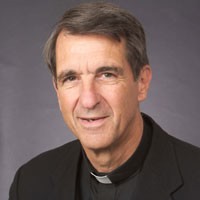 S.J., founder of Ignatius Press and student of Pope Benedict, joins us to break open the gift of insight and wisdom contained in this inspirational work of our Holy Father. As the Pope Benedict states in the preface in the 2nd edition of the book, that approach, taken in the book, puts the question of God and the question about Christ in the very center, which leads to a “narrative Christology” and demonstrates that the place for faith is in the Church. It is an excellent edition to all Christian libraries and a must for anyone seeking a richer appreciation of the teachings of faith. Pope Benedict uses the Old and New Testament, the teachings of the Fathers of the Church and generations of Saints, as well as the beauty of the Church’s Tradition to ponder the reality of Christ. It’s beautiful!
S.J., founder of Ignatius Press and student of Pope Benedict, joins us to break open the gift of insight and wisdom contained in this inspirational work of our Holy Father. As the Pope Benedict states in the preface in the 2nd edition of the book, that approach, taken in the book, puts the question of God and the question about Christ in the very center, which leads to a “narrative Christology” and demonstrates that the place for faith is in the Church. It is an excellent edition to all Christian libraries and a must for anyone seeking a richer appreciation of the teachings of faith. Pope Benedict uses the Old and New Testament, the teachings of the Fathers of the Church and generations of Saints, as well as the beauty of the Church’s Tradition to ponder the reality of Christ. It’s beautiful!
[powerpress]
For more information on this work as well as all the books by Joseph Cardinal Ratzinger (Pope Benedict XVI), go to www.ignatius.com
Tags: cardinal joseph ratizinger, catholic, catholic podcast, catholic prayer, cathollc spirituality, christian classic, Church, faith, ignatius press, introduction to christianity, joseph cardinal ratzinger, joseph fessio, pope benedict, pope benedict xvi, work
This entry was posted on Monday, April 4th, 2011 at 10:24 am
You can follow any responses to this entry through the RSS 2.0 feed.
Episode 2 Jesus of Nazareth part 2: Holy Week From the Entrance into Jerusalem to the  Resurrction by Pope Benedict XVI is INCREDIBLE…absolutely worth the wait! It would be like making a “sophie’s choice” to pick between the two, but if I had to, this work by our Holy Father would be it. A meditation which brings us to contemplate the person of Jesus…especially meaningful in the context of Holy Week and Easter! Pope Benedict XVI shows us once again the importance of making the journey from the “head to the heart”. Mark Brumley is a master in breaking open the riches found in this treasure box of a book.
Resurrction by Pope Benedict XVI is INCREDIBLE…absolutely worth the wait! It would be like making a “sophie’s choice” to pick between the two, but if I had to, this work by our Holy Father would be it. A meditation which brings us to contemplate the person of Jesus…especially meaningful in the context of Holy Week and Easter! Pope Benedict XVI shows us once again the importance of making the journey from the “head to the heart”. Mark Brumley is a master in breaking open the riches found in this treasure box of a book.
Visit the Jesus of Nazareth II site
[powerpress]
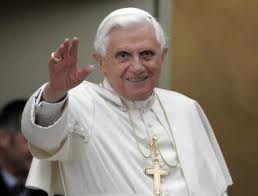
For part 1 of our discussion with Mark visit: IP#85 Mark Brumley – Pope Benedict’s XVI’s Jesus of Nazareth part 2 on Inside the Pages ep 1
Tags: catholic, catholic podcast, catholic prayer, cathollc spirituality, holy week, jesus of nazareth, mark brumley, pope benedict, pope benedict xvi
This entry was posted on Monday, March 14th, 2011 at 7:18 pm
You can follow any responses to this entry through the RSS 2.0 feed.
Episode 1. Jesus of Nazareth part 2: Holy Week From the Entrance into Jerusalem to the  Resurrction by Pope Benedict XVI is INCREDIBLE…absolutely worth the wait! It would be like making a “sophie’s choice” to pick between the two, but if I had to, this work by our Holy Father would be it. A meditation which brings us to contemplate the person of Jesus…especially meaningful in the context of Holy Week and Easter! Pope Benedict XVI shows us once again the importance of making the journey from the “head to the heart”. Mark Brumley is a master in breaking open the riches found in this treasure box of a book.
Resurrction by Pope Benedict XVI is INCREDIBLE…absolutely worth the wait! It would be like making a “sophie’s choice” to pick between the two, but if I had to, this work by our Holy Father would be it. A meditation which brings us to contemplate the person of Jesus…especially meaningful in the context of Holy Week and Easter! Pope Benedict XVI shows us once again the importance of making the journey from the “head to the heart”. Mark Brumley is a master in breaking open the riches found in this treasure box of a book.
Visit the Jesus of Nazareth II site
[powerpress]

For part 2 of our discussion with Mark visit: IP#85 Mark Brumley – Pope Benedict’s XVI’s Jesus of Nazareth part 2 on Inside the Pages ep 2
Tags: benedict xvi, catholic, catholic podcast, catholic prayer, cathollc spirituality, jesus of nazareth, mark brumley, pope benedict, pope benedict xvi
This entry was posted on Friday, March 11th, 2011 at 8:33 am
You can follow any responses to this entry through the RSS 2.0 feed.
And I love our Holy Father too!
Tags: catholic, catholic podcast, catholic prayer, cathollc spirituality, jesus of nazareth, pope benedict xvi
This entry was posted on Thursday, March 10th, 2011 at 4:40 pm
You can follow any responses to this entry through the RSS 2.0 feed.
“Modern and American Dignity: Who We Are As Persons, and What That Means For Our Future” by Dr. Peter 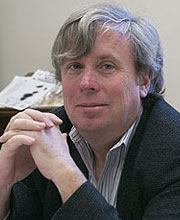 Augustine Lawler is a must have for any who loves to read, think…and ponder. By drawing upon the wisdom from masters like Socrates to Solzhenitsyn, Tocqueville to Chesterton, John Courtney Murray to our “philosopher-pope” Benedict XVI (which I just LOVE), Dr. Lawler uses a charming blend of wit and elegance to fashion a contemporary and relevant understanding of today’s political and moral debates, all the while leaving his “Catholic lenses” firmly in place. He is fantastic. Dr. Lawler guides us through the minefield of contemporary thinking to the heart of the dignity and value of each human person.
Augustine Lawler is a must have for any who loves to read, think…and ponder. By drawing upon the wisdom from masters like Socrates to Solzhenitsyn, Tocqueville to Chesterton, John Courtney Murray to our “philosopher-pope” Benedict XVI (which I just LOVE), Dr. Lawler uses a charming blend of wit and elegance to fashion a contemporary and relevant understanding of today’s political and moral debates, all the while leaving his “Catholic lenses” firmly in place. He is fantastic. Dr. Lawler guides us through the minefield of contemporary thinking to the heart of the dignity and value of each human person.
[powerpress]
Tags: benedict xvi, catholic, catholic podcast, catholic prayer, cathollc spirituality, chesterton, human person, john courtney murray, moral debates, peter augustine lawler, pope benedict xvi, socrates, tocqueville
This entry was posted on Tuesday, February 22nd, 2011 at 9:46 pm
You can follow any responses to this entry through the RSS 2.0 feed.
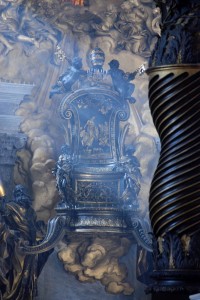 The Feast of the Chair of St. Peter is not so much a feast celebrating a “chair”, but more a feast celebrating what the chair symbolizes…the gift of the Papacy. I remember seeing it for the first time…not only the stunning piece used to preserve it by Bernini…but the whole altar piece setting at St. Peter’s…breathtaking. Almost every time I now see the presider’s chair at my local parish or the chair at our cathedral, I think of this chair, but also of the great unity it gives us with the entire Catholic Church under the leadership of the successor of St. Peter…our Holy Father. God bless the Holy Father, Pope Benedict XVI. Praise be to God for the gift of the Pa
The Feast of the Chair of St. Peter is not so much a feast celebrating a “chair”, but more a feast celebrating what the chair symbolizes…the gift of the Papacy. I remember seeing it for the first time…not only the stunning piece used to preserve it by Bernini…but the whole altar piece setting at St. Peter’s…breathtaking. Almost every time I now see the presider’s chair at my local parish or the chair at our cathedral, I think of this chair, but also of the great unity it gives us with the entire Catholic Church under the leadership of the successor of St. Peter…our Holy Father. God bless the Holy Father, Pope Benedict XVI. Praise be to God for the gift of the Pa pacy!
pacy!
Take a listen to Dr. Matthew Bunson talk to us about the importance of this feast in the podcast above.
Also here is the text from the Holy Father’s reflections on this feast from 2006Â from Vatican.va
“On this rock I will build my Church’
Dear Brothers and Sisters,
Today, the Latin-rite liturgy celebrates the Feast of the Chair of St Peter. This is a very ancient tradition, proven to have existed in Rome since the fourth century. On it we give thanks to God for the mission he entrusted to the Apostle Peter and his Successors.
“Cathedra” literally means the established seat of the Bishop, placed in the mother church of a diocese which for this reason is known as a “cathedral”; it is the symbol of the Bishop’s authority and in particular, of his “magisterium”, that is, the evangelical teaching which, as a successor of the Apostles, he is called to safeguard and to transmit to the Christian Community.
When a Bishop takes possession of the particular Church that has been entrusted to him, wearing his mitre and holding the pastoral staff, he sits on the cathedra. From this seat, as teacher and pastor, he will guide the journey of the faithful in faith, hope and charity.
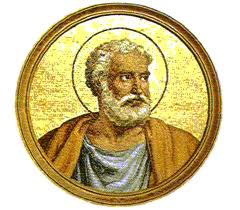 So what was the “Chair” of St Peter? Chosen by Christ as the “rock” on which to build the Church (cf. Mt 16:Â 18), he began his ministry in Jerusalem, after the Ascension of the Lord and Pentecost. The Church’s first “seat” was the Upper Room, and it is likely that a special place was reserved for Simon Peter in that room where Mary, Mother of Jesus, also prayed with the disciples. Therefore, we have the journey from Jerusalem, the newly born Church, to Antioch, the first centre of the Church formed from pagans and also still united with the Church that came from the Jews. Then Peter went to Rome, the centre of the Empire, the symbol of the “Orbis” – the “Urbs”, which expresses “Orbis”, the earth, where he ended his race at the service of the Gospel with martyrdom.
So what was the “Chair” of St Peter? Chosen by Christ as the “rock” on which to build the Church (cf. Mt 16:Â 18), he began his ministry in Jerusalem, after the Ascension of the Lord and Pentecost. The Church’s first “seat” was the Upper Room, and it is likely that a special place was reserved for Simon Peter in that room where Mary, Mother of Jesus, also prayed with the disciples. Therefore, we have the journey from Jerusalem, the newly born Church, to Antioch, the first centre of the Church formed from pagans and also still united with the Church that came from the Jews. Then Peter went to Rome, the centre of the Empire, the symbol of the “Orbis” – the “Urbs”, which expresses “Orbis”, the earth, where he ended his race at the service of the Gospel with martyrdom.
…This is testified by the most ancient Fathers of the Church, such as, for example, St Irenaeus, Bishop of Lyons, but who came from Asia Minor, who in his treatise Adversus Haereses, describes the Church of Rome as the “greatest and most ancient, known by all… founded and established in Rome by the two most glorious Apostles, Peter and Paul”; and he added:Â “The universal Church, that is, the faithful everywhere, must be in agreement with this Church because of her outstanding superiority” (III, 3, 2-3)….
Tertullian, a little later, said for his part:Â “How blessed is the Church of Rome, on which the Apostles poured forth all their doctrine along with their blood!” (De Praescriptione Hereticorum, 36).
Consequently, the Chair of the Bishop of Rome represents not only his service to the Roman community but also his mission as guide of the entire People of God.
Celebrating the “Chair” of Peter, therefore, as we are doing today, means attributing a strong spiritual significance to it and recognizing it as a privileged sign of the love of God, the eternal Good Shepherd, who wanted to gather his whole Church and lead her on the path of salvation.
Among the numerous testimonies of the Fathers, I would like to quote St Jerome’s. It is an extract from one of his letters, addressed to the Bishop of Rome. It is especially interesting precisely because it makes an explicit reference to the “Chair” of Peter, presenting it as a safe harbour of truth and peace.
This is what Jerome wrote:Â “I decided to consult the Chair of Peter, where that faith is found exalted by the lips of an Apostle; I now come to ask for nourishment for my soul there, where once I received the garment of Christ. I follow no leader save Christ, so I enter into communion with your beatitude, that is, with the Chair of Peter, for this I know is the rock upon which the Church is built” (cf. Le lettere I, 15, 1-2).
Dear brothers and sisters, in the apse of St Peter’s Basilica, as you know, is the monument to the Chair of the Apostle, a mature work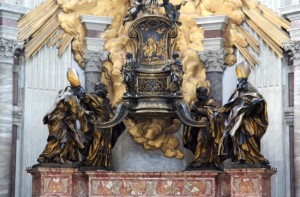 of Bernini. It is in the form of a great bronze throne supported by the statues of four Doctors of the Church: two from the West, St Augustine and St Ambrose, and two from the East:Â St John Chrysostom and St Athanasius.
of Bernini. It is in the form of a great bronze throne supported by the statues of four Doctors of the Church: two from the West, St Augustine and St Ambrose, and two from the East:Â St John Chrysostom and St Athanasius.
I invite you to pause before this evocative work which today can be admired, decorated with myriads of candles, and to say a special prayer for the ministry that God has entrusted to me. Raise your eyes to the alabaster glass window located directly above the Chair and call upon the Holy Spirit, so that with his enlightenment and power, he will always sustain my daily service to the entire Church. For this, as for your devoted attention, I thank you from my heart. –Vatican.va
Tags: bernini, catholic, catholic podcast, catholic prayer, cathollc spirituality, papacy, pope benedict xvi, st peter
This entry was posted on Tuesday, February 22nd, 2011 at 7:26 am
You can follow any responses to this entry through the RSS 2.0 feed.
VATICAN CITY, 9 FEB 2011 (VIS) – Benedict XVI dedicated his catechesis during this morning’s general audience to St. Peter Canisius, whom Leo XIII proclaimed as “the second apostle of Germany”, and who was subsequently canonised and proclaimed as a Doctor of the Church by Pius XI in 1925.
Born at Nijmegen in the Netherlands in 1521, Peter Canisius entered the Society of Jesus in 1543 and was ordained a priest in 1546. In 1548, St. Ignatius of Loyola sent him to complete his spiritual formation in Rome. A year later he moved to the Duchy of Bavaria where he became dean and rector of the University of Ingolstadt. Later he was administrator of the diocese of Vienna, Austria, where he practiced his pastoral ministry in hospitals and prisons. In the year 1566 he founded the College of Prague and, until 1569, was the first superior of the Jesuit province of upper Germany.
In this role he created a network of Jesuit communities in Germanic countries, especially schools, which became starting points for the Catholic Reformation. He participated in religious discussions with Protestant leaders, including Melanchthon, held in the city of Worms, acted as pontifical nuncio to Poland, participated in the two Diets of Augsburg in 1559 and in 1565, and attended the closing session of the Council of Trent. In 1580 he retired to Fribourg in Switzerland where he dedicated himself to writing and where he died in 1597. Peter Canisius also edited the complete works of Cyril of Alexandria and of St. Leo the Great, and the Letters of St. Jerome.
Among his most famous works were his three “Catechises”, written between 1555 and 1558. The first was aimed at students capable of understanding the basic notions of theology; the second at ordinary young people for their primary religious education; and the third at children with a medium- or secondary-school education.
“One characteristic of St. Peter Canisius”, said the Holy Father, was “that he was able to harmonise fidelity to dogmatic principles with the respect due to each individual. … In a historical period of deep confessional contrasts, he avoided severity and the rhetoric of anger, something fairly rare in discussions among Christians at that time, … and sought only to explain our spiritual roots and to revitalise faith in the Church”.
“In the works destined for the spiritual education of the masses, our saint insists on the importance of the liturgy, … the rites of Mass and the other Sacraments. However, at the same time, he is careful to show the faithful the importance and beauty of individual daily prayer to accompany and permeate participation in the Church’s public worship”, said Benedict XVI, pointing our that “this exhortation and this methodology maintain all their value, especially after being authoritatively re-presented by Vatican Council II”.
Peter Canisius “clearly teaches that apostolic ministry is incisive and produces fruits of salvation in people’s hearts only if the preacher is a personal witness of Jesus and knows how to become His instrument, closely bound to Him through faith in His Gospel and in His Church, through a morally coherent life and incessant prayer”. AG/VIS 20110209 (530)
Tags: catholic, catholic podcast, catholic prayer, cathollc spirituality, doctor of the church, jesuits, pope benedict xvi, society of jesus, st peter canisius
This entry was posted on Wednesday, February 9th, 2011 at 9:13 am
You can follow any responses to this entry through the RSS 2.0 feed.
 Patroness of Artists and Against Spiritual Temptation
Patroness of Artists and Against Spiritual Temptation
VATICAN CITY, 29 DEC 2010 (vatican.va) –
Dear Brothers and Sisters,
In a recent Catechesis I spoke of St Catherine of Siena. Today I would like to present to you another less well known Saint who has the same name: St Catherine of Bologna, a very erudite yet very humble woman. She was dedicated to prayer but was always ready to serve; generous in sacrifice but full of joy in welcoming Christ with the Cross. Catherine was born in Bologna on 8 September 1413, the eldest child of Benvenuta Mammolini and John de’ Vigri, a rich and cultured patrician of Ferrara, a doctor in law and a public lector in Padua, where he carried out diplomatic missions for Nicholas III d’Este, Marquis of Ferrara.
Not much information about Catherine’s infancy and childhood is available and not all of it is reliable. As a child she lived in her grandparents’ house in Bologna, where she was brought up by relatives, especially by her mother who was a woman of deep faith. With her, Catherine moved to Ferrara when she was about 10 years old and entered the court of Nicholas III d’Este as lady-in-waiting to Margaret, Nicholas’ illegitimate daughter. The Marquis was transforming Ferrara into a fine city, summoning artists and scholars from various countries. He encouraged culture and, although his private life was not exemplary, took great care of the spiritual good, moral conduct and education of his subjects. In Ferrara Catherine was unaware of the negative aspects that are often part and parcel of court life. She enjoyed Margaret’s friendship and became her confidante. She developed her culture by studying music, painting and dancing; she learned to write poetry and literary compositions and to play the viola; she became expert in the art of miniature-painting and copying; she perfected her knowledge of Latin. In her future monastic life she was to put to good use the cultural and artistic heritage she had acquired in these years. She learned with ease, enthusiasm and tenacity. She showed great prudence, as well as an unusual modesty, grace and kindness in her behaviour. However, one absolutely clear trait distinguished her: her spirit, constantly focused on the things of Heaven. In 1427, when she was only 14 years old and subsequent to certain family events, Catherine decided to leave the court to join a group of young noble women who lived a community life dedicating themselves to God. Her mother trustingly consented in spite of having other plans for her daughter. We know nothing of Catherine’s spiritual path prior to this decision. Speaking in the third person, she states that she entered God’s service, “illumined by divine grace… with an upright conscience and great fervourâ€, attentive to holy prayer by night and by day, striving to acquire all the virtues she saw in others, “not out of envy but the better to please God in whom she had placed all her love†(Le sette armi necessarie alla battaglia spirituali, [The seven spiritual weapons], VII, 8, Bologna 1998, p. 12). She made considerable spiritual progress in this new phase of her life but her trials, her inner suffering and especially the temptations of the devil were great and terrible. She passed through a profound spiritual crisis and came to the brink of despair (cf. ibid., VII, 2, pp. 12-29). She lived in the night of the spirit, and was also deeply shaken by the temptation of disbelief in the Eucharist.
After so much suffering, the Lord comforted her: he gave her, in a vision, a clear awareness of the Real Presence in the Eucharist, an awareness so dazzling that Catherine was unable to express it in words (cf. ibid., VIII, 2. pp. 42-46).
In this same period a sorrowful trial afflicted the community: tension arose between those who wished to follow the Augustinian spirituality and those who had more of an inclination for Franciscan spirituality. Between 1429 and 1430, Lucia Mascheroni, in charge of the group, decided to found an Augustinian monastery. Catherine, on the other hand chose with others to bind herself to the Rule of St Clare of Assisi. It was a gift of Providence, because the community dwelled in the vicinity of the Church of the Holy Spirit, annexed to the convent of the Friars Minor who had adhered to the movement of the Observance. Thus Catherine and her companions could take part regularly in liturgical celebrations and receive adequate spiritual assistance. They also had the joy of listening to the preaching of St Bernardine of Siena (cf. ibid., VII, 62, p. 26). Catherine recounts that in 1429 — the third year since her conversion — she went to make her confession to one of the Friars Minor whom she esteemed, she made a good Confession and prayed the Lord intensely to grant her forgiveness for all her sins and the suffering connected with them.
In a vision God revealed to her that he had forgiven her everything. It was a very strong experience of divine mercy which left an indelible mark upon her, giving her a fresh impetus to respond generously to God’s immense love (cf. ibid. IX, 2, pp. 46-48).
In 1431 she had a vision of the Last Judgement. The terrifying spectacle of the damned impelled her to redouble her prayers and penance for the salvation of sinners. The devil continued to assail her and she entrusted herself ever more totally to the Lord and to the Virgin Mary (cf. ibid., X, 3, pp. 53-54). In her writings, Catherine has left us a few essential notes concerning this mysterious battle from which, with God’s grace, she emerged victorious. She did so in order to instruct her sisters and those who intend to set out on the path of perfection: she wanted to put them on their guard against the temptations of the devil who often conceals himself behind deceptive guises, later to sow doubts about faith, vocational uncertainty and sensuality. In her autobiographical and didactic treatise, The Seven Spiritual Weapons, Catherine offers in this regard teaching of deep wisdom and profound discernment. She speaks in the third person in reporting the extraordinary graces which the Lord gives to her and in the first person in confessing her sins. From her writing transpires the purity of her faith in God, her profound humility, the simplicity of her heart, her missionary zeal, her passion for the salvation of souls. She identifies seven weapons in the fight against evil, against the devil:
1. always to be careful and diligently strive to do good;
2. to believe that alone we will never be able to do something truly good;
3. to trust in God and, for love of him, never to fear in the battle against evil, either in the world or within ourselves;
4. to meditate often on the events and words of the life of Jesus, and especially on his Passion and his death;
5. to remember that we must die;
6. to focus our minds firmly on memory of the goods of Heaven;
7. to be familiar with Sacred Scripture, always cherishing it in our hearts so that it may give direction to all our thoughts and all our actions.
A splendid programme of spiritual life, today too, for each one of us!
In the convent Catherine, in spite of being accustomed to the court in Ferrara, served in the offices of laundress, dressmaker and breadmaker and even looked after the animals. She did everything, even the lowliest tasks, with love and ready obedience, offering her sisters a luminous witness. Indeed she saw disobedience as that spiritual pride which destroys every other virtue. Out of obedience she accepted the office of novice mistress, although she considered herself unfit for this office, and God continued to inspire her with his presence and his gifts: in fact she proved to be a wise and appreciated mistress. Later the service of the parlour was entrusted to her. She found it trying to have to interrupt her prayers frequently in order to respond to those who came to the monastery grill, but this time too the Lord did not fail to visit her and to be close to her. With her the monastery became an increasingly prayerful place of self-giving, of silence, of endeavour and of joy. Upon the death of the abbess, the superiors thought immediately of her, but Catherine urged them to turn to the Poor Clares of Mantua who were better instructed in the Constitutions and in religious observance. Nevertheless, a few years later, in 1456, she was asked at her monastery to open a new foundation in Bologna. Catherine would have preferred to end her days in Ferrara, but the Lord appeared to her and exhorted her to do God’s will by going to Bologna as abbess. She prepared herself for the new commitment with fasting, scourging and penance. She went to Bologna with 18 sisters. As superior she set the example in prayer and in service; she lived in deep humility and poverty. At the end of her three-year term as abbess she was glad to be replaced but after a year she was obliged to resume her office because the newly elected abbess became blind. Although she was suffering and and was afflicted with serious ailments that tormented her, she carried out her service with generosity and dedication. For another year she urged her sisters to an evangelical life, to patience and constancy in trial, to fraternal love, to union with the divine Bridegroom, Jesus, so as to prepare her dowry for the eternal nuptials. It was a dowry that Catherine saw as knowing how to share the sufferings of Christ, serenely facing hardship, apprehension, contempt and misunderstanding (cf. Le sette armi spirituali, X, 20, pp. 57-58). At the beginning of 1463 her health deteriorated. For the last time she gathered the sisters in Chapter, to announce her death to them and to recommend the observance of the Rule. Towards the end of February she was harrowed by terrible suffering that was never to leave her, yet despite her pain it was she who comforted her sisters, assuring them that she would also help them from Heaven. After receiving the last Sacraments, she give her confessor the text she had written: The Seven Spiritual Weapons, and entered her agony; her face grew beautiful and translucent; she still looked lovingly at those who surrounded her and died gently, repeating three times the name of Jesus. It was 9 March 1463 (cf. I. Bembo, Specchio di illuminazione, Vita di S. Caterina a Bologna,Florence 2001, chap. III). Catherine was to be canonized by Pope Clement XI on 22 May 1712. Her incorrupt body is preserved in the city of Bologna, in the chapel of the monastery of Corpus Domini. Dear friends, with her words and with her life, St Catherine of Bologna is a pressing invitation to let ourselves always be guided by God, to do his will daily, even if it often does not correspond with our plans, to trust in his Providence which never leaves us on our own. In this perspective, St Catherine speaks to us; from the distance of so many centuries she is still very modern and speaks to our lives.
She, like us, suffered temptations, she suffered the temptations of disbelief, of sensuality, of a difficult spiritual struggle. She felt forsaken by God, she found herself in the darkness of faith. Yet in all these situations she was always holding the Lord’s hand, she did not leave him, she did not abandon him. And walking hand in hand with the Lord, she walked on the right path and found the way of light.
So it is that she also tells us: take heart, even in the night of faith, even amidst our many doubts, do not let go of the Lord’s hand, walk hand in hand with him, believe in God’s goodness. This is how to follow the right path!
And I would like to stress another aspect: her great humility. She was a person who did not want to be someone or something; she did not care for appearances, she did not want to govern. She wanted to serve, to do God’s will, to be at the service of others. And for this very reason Catherine was credible in her authority, because she was able to see that for her authority meant, precisely, serving others.
Let us ask God, through the intercession of Our Saint, for the gift to achieve courageously and generously the project he has for us, so that he alone may be the firm rock on which our lives are built. Thank you.
Tags: Bologna, catholic, catholic podcast, catholic prayer, cathollc spirituality, evil, faith, franciscan spirituality, mystic of the Church, poor clares, pope benedict xvi, Saint Catherine, spiritual weapons, st catherine of bologna, suffering, temptations, women of the middle ages
This entry was posted on Thursday, December 30th, 2010 at 5:53 am
You can follow any responses to this entry through the RSS 2.0 feed.
Episode 4 – Regnum Novum: Bringing forth the New Evangelization through Catholic Social Teaching with Omar Guiterrez – Value 4 Truth, Freedom, Justice, and Love part 1 “Truth and Freedom”
– Value 4 Truth, Freedom, Justice, and Love part 1 “Truth and Freedom”
Discerning Hearts is blessed to present Omar F. A. Guiterrez, M.A. , Special Assistant to Archbishop George Lucas of the Archdiocese of Omaha, in a groundbreaking series which breaks open the heart of Catholic Social Doctrine.
We encourage you to visit “Regnum Novum – A New Kingdom: A Revolution” Omar Guiterrez’s blog site
 We live at a very special time. The confluence of many things has brought forth the clear need to be able to articulate the Social Teaching of the Catholic Church in a way that is accessible and applicable. This is not to be an effort where high-minded theories are to be bandied about. Rather, this is a time of opportunity wherein we can apply the Social Doctrine to the concrete so as to bring about a New Kingdom, a Revolution. – Omar G. from Regnum Novum
We live at a very special time. The confluence of many things has brought forth the clear need to be able to articulate the Social Teaching of the Catholic Church in a way that is accessible and applicable. This is not to be an effort where high-minded theories are to be bandied about. Rather, this is a time of opportunity wherein we can apply the Social Doctrine to the concrete so as to bring about a New Kingdom, a Revolution. – Omar G. from Regnum Novum
[powerpress]
From episode … 4. Truth, Freedom, Justice, and Love part 1 “Truth and Freedom”
These are the four values of the Social Teaching of the Catholic Church as they’re enumerated in the Compendium and as they were laid out by, again, Blessed Pope John XXIII in Mater et magistra and Pacem in terris. Without these values, the work of social justice becomes an albatross around our necks. It pulls us down, threatening to poison all the work we do, no matter how well intentioned.
When charity lacks truth, as Pope Benedict XVI states, it can be filled with every whim and agenda and becomes the opposite of itself. Truth is the truth of the fundamental dignity of the human person, a dignity we can only fully appreciate in the encounter with Christ.
A freedom that requires self-destruction is no freedom at all. Authentic freedom is the ability to do what is good, but this requires that we know the truth about the good.
(Justice and Love covered in proceeding episodes)
Also visit Omar’s “Discerning Hearts” page Catholic Social Teaching 101
Tags: catholic, catholic podcast, catholic prayer, catholic social doctrine, cathollc spirituality, dignity of the human person, freedom, pope benedict xvi, pope john xxiii, social teaching of the catholic church, truth
This entry was posted on Wednesday, December 29th, 2010 at 7:00 am
You can follow any responses to this entry through the RSS 2.0 feed.
“Recalling with great fondness my four-day visit to the United Kingdom last September, I am glad to have the opportunity to greet you once again, and indeed to greet listeners everywhere as we prepare to celebrate the birth of Christ. Our thoughts turn back to a moment in history when God’s chosen people, the children of Israel, were living in intense expectation. They were waiting for the Messiah that God had promised to send, and they pictured him as a great leader who would rescue them from foreign domination and restore their freedom.”
“God is always faithful to his promises, but he often surprises us in the way he fulfils them.â€
“God is always faithful to his promises, but he often surprises us in the way he fulfils them. The child that was born in Bethlehem did indeed bring liberation, but not only for the people of that time and place – he was to be the Saviour of all people throughout the world and throughout history. And it was not a political liberation that he brought, achieved through military means: rather, Christ destroyed death for ever and restored life by means of his shameful death on the Cross. And while he was born in poverty and obscurity, far from the centres of earthly power, he was none other than the Son of God. Out of love for us he took upon himself our human condition, our fragility, our vulnerability, and he opened up for us the path that leads to the fullness of life, to a share in the life of God himself. As we ponder this great mystery in our hearts this Christmas, let us give thanks to God for his goodness to us, and let us joyfully proclaim to those around us the good news that God offers us freedom from whatever weighs us down: he gives us hope, he brings us life.
Dear Friends from Scotland, England, Wales and indeed every part of the English-speaking world, I want you to know that I keep all of you very much in my prayers during this Holy Season. I pray for your families, for your children, for those who are sick, and for those who are going through any form of hardship at this time. I pray especially for the elderly and for those who are approaching the end of their days. I ask Christ, the light of the nations, to dispel whatever darkness there may be in your lives and to grant to every one of you the grace of a peaceful joyful Christmas. May God bless all of you!” –BBC4
Tags: birth of christ, catholic, catholic podcast, catholic prayer, cathollc spirituality, faithful to his promises, pope benedict xvi
This entry was posted on Sunday, December 26th, 2010 at 9:20 am
You can follow any responses to this entry through the RSS 2.0 feed.

